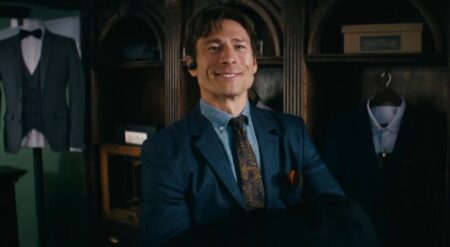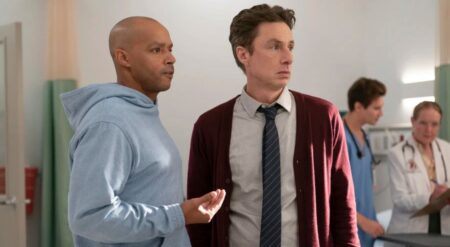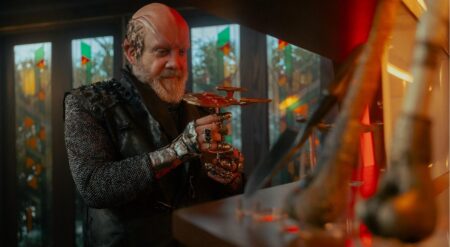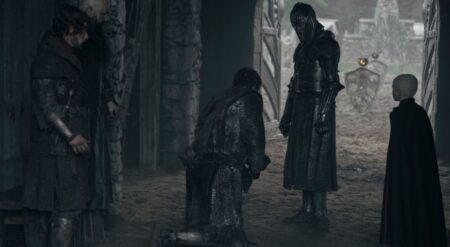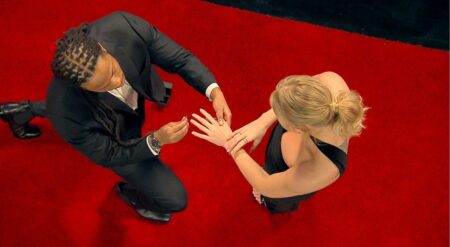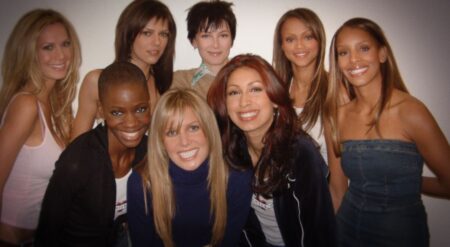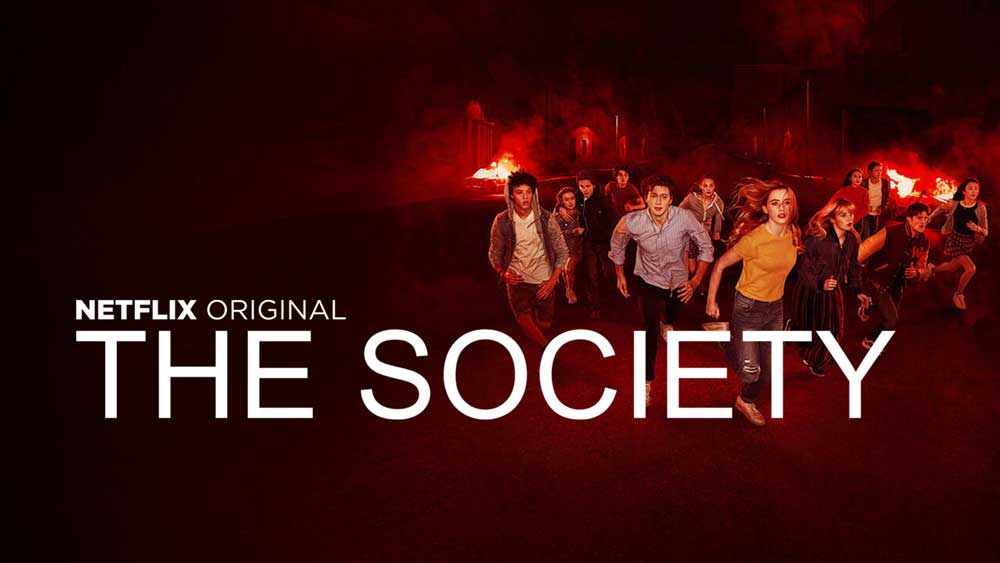
Minor Plot Details for The Society, Season One Below
The majority of us had to read The Lord of the Flies at some point during our educational careers. The premise is simple: boys are trapped on an island, develop their own society and after a murder dynamics devolve the stakes raise. In Netflix’s new original series The Society, we see this classic premise played out in a new way.
Created by Christopher Keyser, The Society centers around a Northeastern town that has been filled with a strange smell. While the parents are concerned with getting rid of the smell for a second time, the teenagers of the town are just being teenagers. With high school plays and a school trip on the horizon, the return of the smell, while weird, doesn’t break their lives. That is until the high schoolers take off on their school trip only to return to their town the same night. Except, their town isn’t their town and their families are nowhere to be seen.
The first night that they realize the parents are gone they stage a party at the local church. Booze, debauchery, and excitement for their autonomy are at the center and they forget to question what happened their town. Now, not all of the teens are there, with some of our main cast choosing to go home or investigate. After Bean () discovers that there is no internet and no connection to the world outside the town, the next morning turns from celebration to fear.
As the kids search for a way out of town, they’re hit with the realization that their wealthy sleepy town isn’t their actual town, but instead a replica of it with streets that lead to nowhere, train tracks that just stop, and dense forest surrounding it in every direction. After the first episode, the show quickly moves away from finding out why the kids are left alone and it moves towards the dynamics between characters and the struggle to create a new society.
While an air of science fiction hangs over the teens, the real danger lies in the limited food supply, volatile teenage boys, and a group of teenagers who must move from childhood to adulthood in one night. Because of this the show excels by presenting its audience with interesting, grounded, and heavy interpersonal dynamics between its massive list of main characters: Allie (Kathryn Newton), Cassandra (Rachel Keller), Harry (Alex Fitzalan), Helena (Natasha Liu Bordizzo), Will (Jacques Colimon), Sam (Sean Berdy), Campbell (Toby Wallace), Grizz (Jack Mulhern), Elle (Olivia DeJonge), Becca (Gideon Adlon), and Gordie (José Julián). While the cast is large, those mentioned have larger arcs and are involved in pivotal power dynamics.
As the group of high schoolers is thrust into a world they are unprepared for, they lean on each other or fight with each other as they deal with the fear and isolation of being separated from their families. Like in Lord of the Flies, there is a division amongst the teens. There are those who are putting the survival of the community first, led by Allie, Cassandra, and Will. Then there are those who are out for themselves, led by Harry and Campbell. And even still there are those who lie in-between, stuck because of their intimate partners and others because of fear, namely Becca and Kelly.
The Society fuses the exploration of society without rules and adolescence in a way similar to Lord of the Flies when a murder rocks both camps, with leaders clashing and acquiescing when fear of each other, instead of the outside world, consumes the town. However, given the ages of the protagonists, there is a new set of problems: sex, violence, and rich kids who were not prepared for anything that wasn’t a football game or school play. It’s because of this that the show takes survival and merges it with teen drama.
While others have called The Society a mix between Lord of the Flies and Degrassi, there is a maturity to the way that the series handles themes that go deeper than the surface and permeate multiple issues, setting it apart. While the show deals with issues of depression, teen pregnancy, homophobia, among other topics, what holds the most weight for me, given my own experiences with trauma is the abusive relationship between Elle and Campbell.
While some of their dialogue leans heavily into the teen drama, the spiral of fear is real and terrifying to watch, something in a way that I wasn’t expecting. It starts small but soon Elle is in the midst of a violent relationship with a guy who routinely promises to protect her from the outside world while causing her pain. Frozen with fear, Elle has to make choices that could result in her death, the death of others, or his.
While Campbell’s brother Sam reveals that he is a bonafide psychopath, no one in the community seems to see the violence he inflicts on Elle. In most representations of domestic abuse there are large black eyes and visible bodily trauma, but in real life — although that does happen — it’s more insidious, as the camera shows while Elle changes, small bruises on her side or as we witness, abuse that leads no physical mark but scares Elle emotionally.
Campbell sees his violence as normal and because she’s been threatened with death. Elle hides it. As Elle becomes desperate she attempts to escape multiple times and as we root for her, we also feel Campbell’s influence hanging over her every decision, even ones that she makes to free herself. The ability for the show to show trauma in a nuanced way is to be commended and this subplot is done in a way that isn’t shocking so much as it feels real. It’s respectful and not just thrown in, while we get to learn Elle outside of it, this is just one piece of evil that defines Campbell and as the season unfolds he becomes the main antagonist, even when he isn’t in the spotlight.
Outside of the trauma, the show also represents a diverse group of high school students. Well, diverse given the teen drama genre and the exclusivity of the community in the Northeast. While there are characters from different ethnicities, the use of an ethnically diverse cast sometimes feels more tokenistic than thoughtful. While the total cast includes people of color, their stories only revolve around the leaders in the story who are all white and fit the stereotypes associated with affluent high schools, drugs and all.
That being said, the series explores sexuality in a meaningful way with Sam, one of our lead characters moving from a teen scared and alone, worried that the permanence of their isolation would mean that his life as a gay man would leave romantically alone. In the beginning, it seems like Sam will be relegated to the “gay best friend” trope along with Will, the only main characters of color in the season who is might be limited to “kid from the wrong side of the tracks,” but he isn’t. Instead, Sam begins a healthy relationship and explores his identity.
In addition to this, Sam is also deaf and played by a deaf actor. Having rightfully come under criticism for their use of incorrect sign language and casting a hearing actress in the lead role of their original film The Silence, Netflix doesn’t repeat that mistake. Instead, The Society offers us a Sam as a dynamic character, who is beyond tropes and whose identity as a deaf and gay teen doesn’t define him – except for in the eyes of his brother Campbell, who as stated early is an awful human.
In the show, Campbell is the cousin of the two sisters who are in the lead of the series, Cassandra and Allie. As such, it makes sense that they know sign language in order to speak with him. As the 10-episode season develops, more characters either learn to sign or start to sign more frequently, with more characters outside of Sam’s best friend and family members, those around him learn, they don’t just ignore it.
Since I am not deaf, I can only offer my perspective from outside of the community. To supplement that, I encourage you to seek out some of Berdy’s interviews. Formerly a star in the ABC Family show Switched at Birth, Berdy has spoken about the importance of deaf representation and his role as one of the most prominent deaf stars, as well as how his character diverges from his own experience.
While Same and Elle’s stories kept me the most engaged, each of the main characters receives an ample amount of character development. We see Allie grow out her sister’s shadow, Harry slips into a depressive state, and we get to see the characters individually and communally cope with the loss of life and autonomy. What happens when some of the teens die? What happens to those on the other side of the trigger?
Surprisingly, The Society deals with these issues in dynamic ways despite its issues with standard teen dialogue it is able to deliver hefty amounts of social commentary and fear. One of the reasons I believe this works is not only because of the acting but because of the actors themselves. The ages of the actors behind the high schoolers range from teens to mid-twenties, but all of them are believable. Some have acne, most dress like teens, and not a single one of them is the hyper-sexual or made to look traditionally beautiful like stars on current teen shows like Riverdale. The tension is escalated by the ability of the actors to emote that naïveté and their youth makes the acts of violence all the heavier.
That being said, there are large issues with pacing. The first episode throws in every teen drama storyline in a quick and broad way to the point that I almost quit watching the show. With that, I’m glad that I powered through it. While the pacing of the show with time jumps that distorts the flow of some relationships, the characters make the show worth watching. While the timeline can get slightly confusing at various points the multiple character narratives are wonderfully executed.
With the ending of season one throwing more questions at the audience while offering a shred of an answer, a season two is welcomed and necessary given the tumultuous state of The Society at the end of the show. But, this is a Netflix show so it really is a coin flip as to whether or not the company will invest in a season two, however. This series came out to little fanfare, making me believe that the viewership may not be in the renewal numbers threshold.
Now, don’t enter the show expecting to see a show that deals head-on with the science fiction involved with waking up in a town that is your town but not. Instead, press play if you’re looking for a teen drama series that is more than pretty promo posters and offers a dynamic look at characters, their trauma, and builds out their story arcs.
The Society
-
Rating - 8/108/10
TL;DR
Now, don’t enter the show expecting to see a show that deals head-on with the science fiction involved with waking up in a town that is your town but not. Instead, press play if you’re looking for a teen drama series that is more than pretty promo posters and offers a dynamic look at characters, their trauma, and builds out their story arcs.

